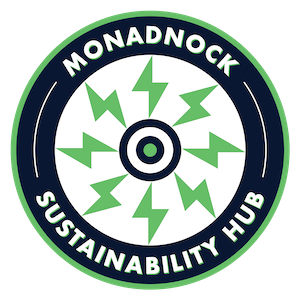By Catherine Owen Koning, Originally Published in The Monadnock Shopper News, Green Monadnock column, July 2025.
Summer in New England. So much to do! May finds us planting our gardens, June sees us picking strawberries, swimming and fishing in the beautiful rivers and ponds, July sends us to the beaches to ride the waves and look for shells, while August brings us to the White Mountains to visit spectacular peaks and waterfalls. After putting up with crazy winters and wet springs, why would anyone leave this glorious region in summer?
But the weather this year has not cooperated! Were there really 13 straight Saturdays of rain this spring, followed by some of the hottest days on record? Hotter and wetter is the outcome of climate change in the northeast. We were making progress in reducing climate pollution with tax incentives and green energy investments of the Inflation Reduction Act, but much of that is gone now because of the recent federal budget bill. Federal and state governments use budgets to invest in activities that they think are in the public interest. These funds are subsidies, in the form of direct payments or less obvious ways to make business cheaper for one company or industry. The US subsidizes farmers, for example, by paying them when crop prices drop too much; the rationale is that we need to have a reliable food supply, so we cannot let our farmers fail.
Like food, energy is something everybody needs, for heat, cooking, electricity, transportation, etc. And like farms, government subsidizes energy so we have a reliable supply and lower costs. In 2022, according to the International Monetary Fund, fossil fuels like coal, oil and natural gas received $3 billion in direct subsidies from the US federal government, in the form of tax credits, reduced lease payments for drilling on public land, payments for exploration and research, etc. Other studies, which include state level funding, estimate direct subsidies at $10 – 52 billion per year.
In addition to these direct funding subsidies, the costs of health care and environmental damage caused by burning fossil fuels create indirect subsidies. Air pollution from fossil fuels causes respiratory illnesses, and the resulting medical attention costs money, for example. Also, burning fossil fuels acidifies our oceans, reducing fish production and destroying coral reefs, causing decreases in fishing and tourism. Altogether, indirect costs like these added up to over $750 billion in 2022, in the US.
By contrast, clean energy sources such as solar, wind, hydro and geothermal have received far less government support. The Inflation Reduction Act passed in 2022 tried to re-adjust that imbalance, by giving homeowners and businesses a 30% tax credit for installing solar panels, or an income adjusted tax credit for buying an electric vehicle, and other green energy investments. A reason given for eliminating the green energy funding in the recently passed budget bill was to save $5.6 billion per year. However, the new budget contains an estimated $18 billion in additional fossil fuel subsidies, including new tax credits, reduced pollution fines, cheaper coal mining and oil drilling on public lands and waters etc.
The loss of clean energy investment credits will lead to fewer solar panels, wind turbines and electric vehicles; so, electricity supply will decrease, and gasoline demand will increase, resulting in higher costs for both. Household energy bills will increase by $140-$500, and there will be roughly 100,000 fewer full-time jobs. Gas prices could go up by as much as 37 cents/gallon. Renewables make up 30% of the world’s energy supply (only 9% in the US), and are now cheaper than fossil fuels.
You can tell people’s priorities by watching where they get their money, and where they spend it. Fossil fuel companies donated heavily to the Republican party, and it worked. They will get richer, and clean energy companies will get poorer. Clearly, affordable, clean energy is not important to our lawmakers! Our economy and our beautiful New England landscapes are at risk. Is this what we want?
Fortunately, local groups are stepping up. The Monadnock Sustainability Hub is developing a new electrification fund, providing financial assistance to homeowners seeking clean, green energy to power efficient heating, cooling and cooking. Check out our website monadnocksustainabilityhub.org for more information.
https://oilchange.org/publications/dirty-energy-dominance-us-subsidies/
https://insideclimatenews.org/news/23062025/senate-republicans-big-oil-tax-benefits/
Catherine Owen Koning is a Professor of Environmental Science at Franklin Pierce University, where she co-coordinates the Institute for Climate Action. She is also a member of the Monadnock Sustainability Hub’s Board of Directors and co-chairs the Keene Clean Energy Team.
